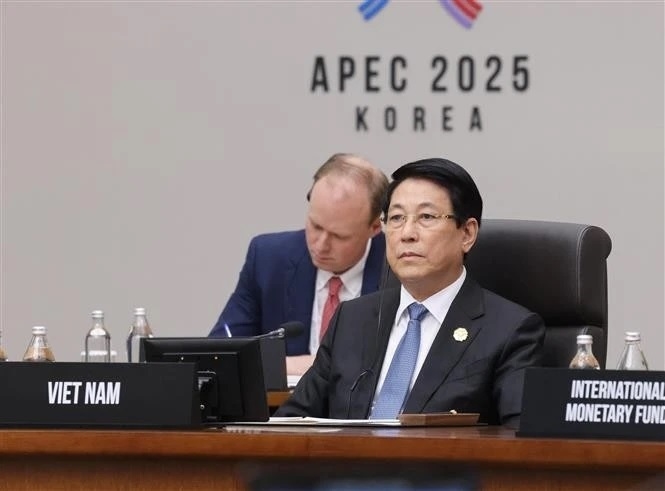The Vietnamese President joined leaders and heads of delegations from other member economies, along with special guests - the Crown Prince of Abu Dhabi and the Managing Director of the International Monetary Fund (IMF) - at the session, discussing measures to advance trade and investment amidst global volatility and foster the public – private partnership to unlock the private economic sector’ potential for inclusive and sustainable growth.
    |
 |
|
Vietnamese State President Luong Cuong at the first plenary session of the APEC Economic Leaders' Meeting in Gyeongju, the Republic of Korea, on October 31 |
President Luong Cuong proposed APEC settle major bottlenecks in regional supply chains and infrastructure through effective digitization of customs clearance procedures, upgrading transport, logistics, and IT infrastructure, and harmonize cross-border data and payment regulations, while narrowing technological gap between economies.
The region, he said, should push ahead trade and investment collaboration by concretizing the multilateral trade agreements under the World Trade Organization (WTO), underscoring it is necessary to provide support for the private economic sector, particularly small and medium-sized enterprises, in accessing capital, technologies, and markets, as well as improving governance capacity to adapt and thrive in the digital era.
President Luong Cuong stressed that in the context of macroeconomic instability, a solid microeconomic foundation serves as the cornerstone for long-term growth, noting the region's development trajectory has affirmed the pivotal role of the private economic sector.
As the host of APEC 2027, Vietnam will work closely with other member economies and partners to deepen regional economic integration, promote green growth, and foster a favorable environment for cooperation and development to build an Asia-Pacific region of peace, stability, and prosperity.
In his opening remarks, Korean President Lee Jae Myung underscored that the meeting offered an opportunity for leaders to engage in open and constructive dialogue aimed at fostering trade and investment, enhancing mutual understanding, and working towards common goals of development and shared prosperity.
Leaders engaged in in-depth discussions on initiatives and ways to enhance resilience and promote international economic linkages to tackle global challenges. They agreed that APEC must harness the potential of the private sector to create jobs, improve livelihoods, and coordinate flexible fiscal and monetary policies to adapt to global volatility.
They held that expanding dialogue and public – private partnership is a critical and effective tool to mobilize resources for common goals, including green investment, sustainable infrastructure development, digital trade, and enhanced competitiveness of small and medium-sized enterprises.
Additionally, they highlighted the importance of regional integration and interconnectivity, urging greater exchange of experience, policy dialogue, and facilitation of trade and investment. They also called for the development of secure, flexible, and sustainable supply chains.
Source: VNA